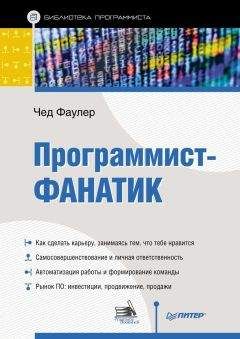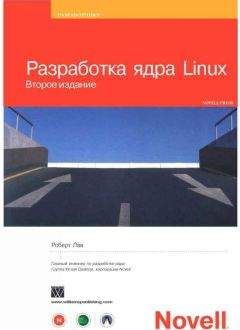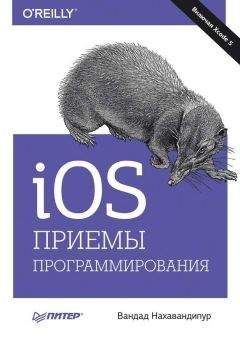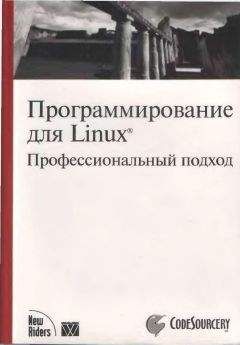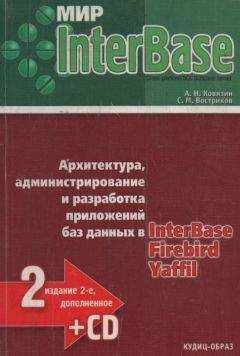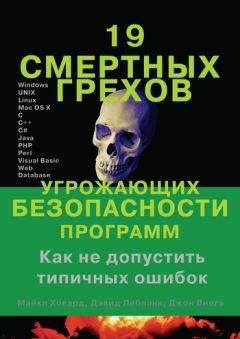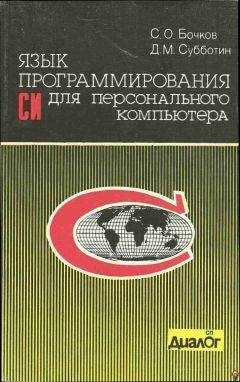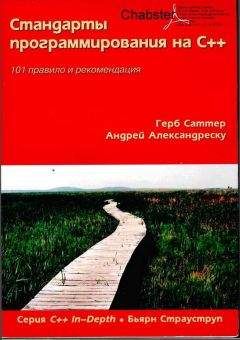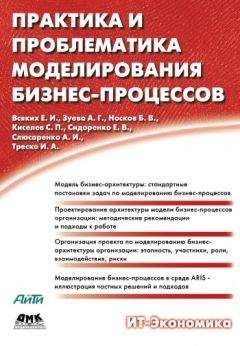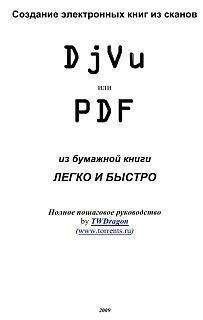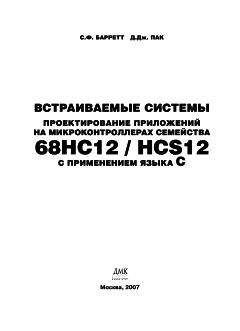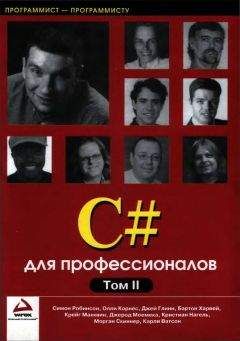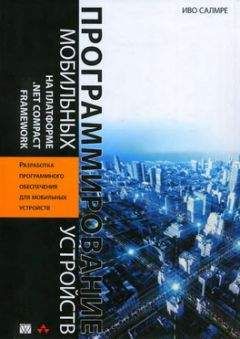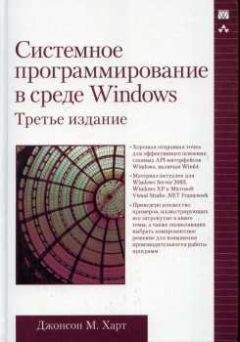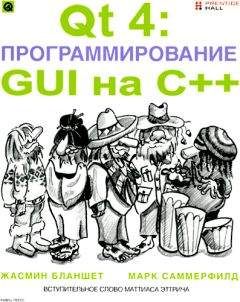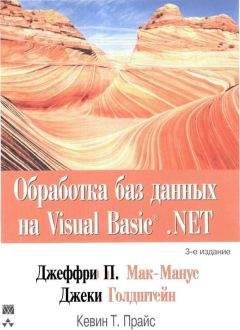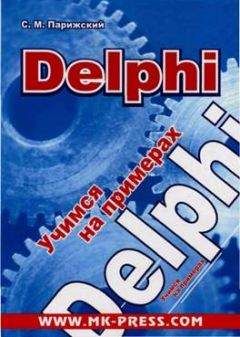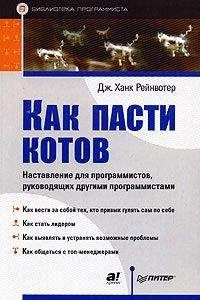Ори Померанц - Энциклопедия разработчика модулей ядра Linux
Скачивание начинается... Если скачивание не началось автоматически, пожалуйста нажмите на эту ссылку.
Жалоба
Напишите нам, и мы в срочном порядке примем меры.
Описание книги "Энциклопедия разработчика модулей ядра Linux"
Описание и краткое содержание "Энциклопедия разработчика модулей ядра Linux" читать бесплатно онлайн.
Linux Kernel Module Programming Guide свободная книга; Вы можете воспроизводить и/или изменять ее в соответствии с версией 2 (или, в вашем случае, любой более поздней версией) GNU General Public License, опубликованной Free Software Foundation. Версия 2 поставляется с этим документом в Приложении E.
Эта книга распространяется в надежде, что будет полезна, но без какой-либо гарантии; даже без подразумеваемой гарантии высокого спроса или пригодности какой-либо для специфической цели.
Автор поощряет широкое распространение этой книги для персонального или коммерческого использования, если вышеупомянутое примечание относительно авторского права остается неповрежденным, и распространитель твердо придерживается условий GNU General Public License (см. Приложение E). Вы можете копировать и распространять эту книгу бесплатно или для получения прибыли. Никакое явное разрешение не требуется от автора для воспроизводства этой книги в любой среде, физической или электронной.
Обратите внимание, производные работы и переводы этого документа должны быть помещены согласно GNU General Public License, и первоначальное примечание относительно авторского права должно остаться неповрежденным. Если Вы пожертвовали новый материал этой книге, Вы должны сделать исходный текст доступным для ваших изменений. Пожалуйста делайте изменения и модификации, доступные непосредственно поддерживающему данный проект Ori Pomerantz. Он объединит модификации и обеспечит непротиворечивость изменений для всего Linux сообщества.
Если Вы планируете издавать и распространять эту книгу коммерчески, пожертвования, лицензионные платежи, и/или напечатанные копии будут высоко оценены автором и Linux Documentation Project (LDP). Содействие таким образом показывает вашу поддержку свободного программного обеспечения и Linux Documentation Project. Если Вы имеете вопросы или комментарии, пожалуйста войдите в контакт с автором по адресу, приведенному выше.
* If the ioctl is write or read/write (meaning output
* is returned to the calling process), the ioctl call
* returns the output of this function. */
int device_ioctl(struct inode *inode, struct file *file,
unsigned int ioctl_num, /* The number of the ioctl */
unsigned long ioctl_param) /* The parameter to it */
{
int i;
char *temp;
#if LINUX_VERSION_CODE >= KERNEL_VERSION(2,2,0)
char ch;
#endif
/* Switch according to the ioctl called */
switch (ioctl_num) {
case IOCTL_SET_MSG:
/* Receive a pointer to a message (in user space)
* and set that to be the device's message. */
/* Get the parameter given to ioctl by the process */
temp = (char*)ioctl_param;
/* Find the length of the message */
#if LINUX_VERSION_CODE >= KERNEL_VERSION(2,2,0)
get_user(ch, temp);
for (i=0; ch && i<BUF_LEN; i++, temp++) get_user(ch, temp);
#else
for (i=0; get_user(temp) && i<BUF_LEN; i++, temp++) ;
#endif
/* Don't reinvent the wheel - call device_write */
#if LINUX_VERSION_CODE >= KERNEL_VERSION(2,2,0)
device_write(file, (char*)ioctl_param, i, 0);
#else
device_write(inode, file, (char*)ioctl_param, i);
#endif
break;
case IOCTL_GET_MSG:
/* Give the current message to the calling
* process - the parameter we got is a pointer, fill it. */
#if LINUX_VERSION_CODE >= KERNEL_VERSION(2,2,0)
i = device_read(file, (char*)ioctl_param, 99, 0);
#else
i = device_read(inode, file, (char*)ioctl_param, 99);
#endif
/* Warning - we assume here the buffer length is
* 100. If it's less than that we might overflow
* the buffer, causing the process to core dump.
*
* The reason we only allow up to 99 characters is
* that the NULL which terminates the string also needs room. */
/* Put a zero at the end of the buffer, so it will be properly terminated */
put_user('\0', (char*)ioctl_param+i);
break;
case IOCTL_GET_NTH_BYTE:
/* This ioctl is both input (ioctl_param) and
* output (the return value of this function) */
return Message[ioctl_param];
break;
}
return SUCCESS;
}
/* Module Declarations *************************** */
/* This structure will hold the functions to be called
* when a process does something to the device we
* created. Since a pointer to this structure is kept in
* the devices table, it can't be local to
* init_module. NULL is for unimplemented functions. */
struct file_operations Fops = {
NULL, /* seek */
device_read,
device_write,
NULL, /* readdir */
NULL, /* select */
device_ioctl, /* ioctl */
NULL, /* mmap */
device_open,
#if LINUX_VERSION_CODE >= KERNEL_VERSION(2,2,0)
NULL, /* flush */
#endif
device_release /* a.k.a. close */
};
/* Initialize the module - Register the character device */
int init_module() {
int ret_val;
/* Register the character device (atleast try) */
ret_val = module_register_chrdev(MAJOR_NUM, DEVICE_NAME, &Fops);
/* Negative values signify an error */
if (ret_val < 0) {
printk("%s failed with %d\n", "Sorry, registering the character device ", ret_val);
return ret_val;
}
printk("%s The major device number is %d.\n", "Registeration is a success", MAJOR_NUM);
printk("If you want to talk to the device driver,\n");
printk ("you'll have to create a device file. \n");
printk ("We suggest you use:\n");
printk ("mknod %s c %d 0\n", DEVICE_FILE_NAME, MAJOR_NUM);
printk ("The device file name is important, because\n");
printk ("the ioctl program assumes that's the\n");
printk ("file you'll use.\n");
return 0;
}
/* Cleanup - unregister the appropriate file from /proc */
void cleanup_module() {
int ret;
/* Unregister the device */
ret = module_unregister_chrdev(MAJOR_NUM, DEVICE_NAME);
/* If there's an error, report it */
if (ret < 0) printk("Error in module_unregister_chrdev: %d\n", ret);
}
chardev.h/* chardev.h - the header file with the ioctl definitions.
*
* The declarations here have to be in a header file,
* because they need to be known both to the kernel
* module (in chardev.c) and the process calling ioctl (ioctl.c)
*/
#ifndef CHARDEV_H
#define CHARDEV_H #
include <linux/ioctl.h>
/* The major device number. We can't rely on dynamic
* registration any more, because ioctls need to know it. */
#define MAJOR_NUM 100
/* Set the message of the device driver */
#define IOCTL_SET_MSG _IOR(MAJOR_NUM, 0, char *)
/* _IOR means that we're creating an ioctl command
* number for passing information from a user process
* to the kernel module.
*
* The first arguments, MAJOR_NUM, is the major device
* number we're using.
*
* The second argument is the number of the command
* (there could be several with different meanings).
*
* The third argument is the type we want to get from
* the process to the kernel. */
/* Get the message of the device driver */
#define IOCTL_GET_MSG _IOR(MAJOR_NUM, 1, char *)
/* This IOCTL is used for output, to get the message
* of the device driver. However, we still need the
* buffer to place the message in to be input,
* as it is allocated by the process. */
/* Get the n'th byte of the message */
#define IOCTL_GET_NTH_BYTE _IOWR(MAJOR_NUM, 2, int)
/* The IOCTL is used for both input and output. It
* receives from the user a number, n, and returns Message[n]. */
/* The name of the device file */
#define DEVICE_FILE_NAME "char_dev"
#endif
ioctl.c/* ioctl.c - the process to use ioctl's to control the
* kernel module
*
* Until now we could have used cat for input and
* output. But now we need to do ioctl's, which require
* writing our own process. */
/* Copyright (C) 1998 by Ori Pomerantz */
/* device specifics, such as ioctl numbers and the major device file. */
#include "chardev.h"
#include <fcntl.h> /* open */
#include <unistd.h> /* exit */
#include <sys/ioctl.h> /* ioctl */
/* Functions for the ioctl calls */
ioctl_set_msg(int file_desc, char *message) {
int ret_val;
ret_val = ioctl(file_desc, IOCTL_SET_MSG, message);
if (ret_val < 0) {
printf("ioctl_set_msg failed:%d\n", ret_val);
exit(-1);
}
}
ioctl_get_msg(int file_desc) {
int ret_val;
char message[100];
/* Warning - this is dangerous because we don't tell
* the kernel how far it's allowed to write, so it
* might overflow the buffer. In a real production
* program, we would have used two ioctls - one to tell
* the kernel the buffer length and another to give
* it the buffer to fill */
ret_val = ioctl(file_desc, IOCTL_GET_MSG, message);
if (ret_val < 0) {
printf("ioctl_get_msg failed:%d\n", ret_val);
exit(-1);
}
printf("get_msg message:%s\n", message);
}
ioctl_get_nth_byte(int file_desc) {
int i;
char c;
printf("get_nth_byte message:");
i = 0;
while (c != 0) {
c = ioctl(file_desc, IOCTL_GET_NTH_BYTE, i++);
if (c < 0) {
printf("ioctl_get_nth_byte failed at the %d'th byte:\n", i);
exit(-1);
}
putchar(c);
}
putchar('\n');
}
/* Main - Call the ioctl functions */
main() {
int file_desc, ret_val;
char *msg = "Message passed by ioctl\n";
file_desc = open(DEVICE_FILE_NAME, 0);
if (file_desc < 0) {
printf("Can't open device file: %s\n", DEVICE_FILE_NAME);
exit(-1);
}
ioctl_get_nth_byte(file_desc);
ioctl_get_msg(file_desc);
ioctl_set_msg(file_desc, msg);
close(file_desc);
}
Загрузочные параметры
Во многих из предыдущих примеров, мы жестко задавали какие-либо параметры в модуле. Это идет против правил Unix и Linux, философия которых такова, что программа должна быть гибкой, чтобы пользователь мог ее настраивать.
Способ сообщить программе или модулю что-либо до запуска это параметры командной строки. В случае ядерных модулей, мы не получаем argc и argv. Вместо этого, мы получаем кое-что лучше. Мы можем определять глобальные переменные в модуле, и insmod заполнит их для нас.
В этом ядерном модуле мы определяем две таких переменных: str1 и str2. Все, что Вы должны делать это скомпилировать модуль и затем выполнить insmod str1=xxx str2=yyy. При вызове init_module str1 укажет на строку `xxx' и str2 на строку `yyy'.
В версии 2.0 не имеется никакого контроля соответствия типов аргументов[6]. Если первый символ str1 или str2 является цифрой, ядро заполнит переменную значением целого числа, а не указателем на строку. В реальной ситуации Вы должны проверять это.
С другой стороны, в версии 2.2 Вы используете макрокоманду MACRO_PARM , чтобы сообщить insmod, что Вы ожидаете параметры, их имена и их типы. Это решает проблему типа и позволяет модулям получать строки, которые начинаются с цифры.
param.c/* param.c
*
* Receive command line parameters at module installation
*/
/* Copyright (C) 1998-99 by Ori Pomerantz */
/* The necessary header files */
/* Standard in kernel modules */
#include <linux/kernel.h> /* We're doing kernel work */
#include <linux/module.h> /* Specifically, a module */
/* Deal with CONFIG_MODVERSIONS */
#if CONFIG_MODVERSIONS==1
#define MODVERSIONS
#include <linux/modversions.h>
#endif
#include <stdio.h> /* I need NULL */
/* In 2.2.3 /usr/include/linux/version.h includes a
Подписывайтесь на наши страницы в социальных сетях.
Будьте в курсе последних книжных новинок, комментируйте, обсуждайте. Мы ждём Вас!
Похожие книги на "Энциклопедия разработчика модулей ядра Linux"
Книги похожие на "Энциклопедия разработчика модулей ядра Linux" читать онлайн или скачать бесплатно полные версии.
Мы рекомендуем Вам зарегистрироваться либо войти на сайт под своим именем.
Отзывы о "Ори Померанц - Энциклопедия разработчика модулей ядра Linux"
Отзывы читателей о книге "Энциклопедия разработчика модулей ядра Linux", комментарии и мнения людей о произведении.





